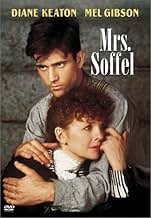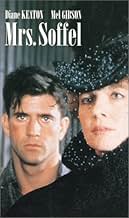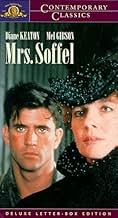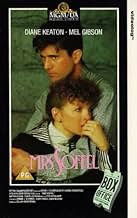IMDb रेटिंग
6.1/10
3.7 हज़ार
आपकी रेटिंग
अपनी भाषा में प्लॉट जोड़ेंDiane Keaton stars as a prison warden's wife who falls in love with a death row convict (Mel Gibson.) Believing he's innocent, she helps him and his convicted brother escape.Diane Keaton stars as a prison warden's wife who falls in love with a death row convict (Mel Gibson.) Believing he's innocent, she helps him and his convicted brother escape.Diane Keaton stars as a prison warden's wife who falls in love with a death row convict (Mel Gibson.) Believing he's innocent, she helps him and his convicted brother escape.
- पुरस्कार
- 3 कुल नामांकन
Jennifer Dundas
- Margaret Soffel
- (as Jennie Dundas)
फ़ीचर्ड समीक्षाएं
"Mrs. Soffel" is a wonderful movie I have seen many times, but the last viewing was so many years ago I'm watching it right now on TCM.
I'm a sucker for movies whose main characters suddenly, inexplicably make a decision which goes against everything they seem to embody, or at least that which the viewer has come to know about them. That Kate Soffel's story is a true one makes it all the more intriguing.
In early 20th-century America, the lot of a wife, even that of a well-to-do-man and mother to lovely children, was a lonely, empty, barren existence. In a wealthy household with servants, there was very little meaningful work for the mistress of the house to do every day.
Even the layers upon layers of clothes Victorian women wore served no practical purpose except to restrict movement and render their wearers merely decorative. Express your opinions and you got packed off to visit relatives in hopes that maybe the change of scenery would "do you good." There were millions of avenues for creative expression and enterprise that were simply cut off for women.
Good minds went to waste. Souls shriveled and died.
Kate Soffel (Diane Keaton) was the wife of a prison warden in Pittsburgh at the turn of the last century. She served as something of a missionary to the prisoners, giving them Bibles, holding prayer readings with them and hoping to guide them towards remorse and redemption. She never expects to fall in love with one of the inmates. But fall she does, for the charming Ed Biddle (Mel Gibson), who along with his brother Jack, (Matthew Modine) are in jail on murder charges.
Kate is suffocating; the Biddles are desperate. Prone to fits of melancholy and depression, plagued with fears that she is not a good mother and that she has failed her husband -- whom she has come to learn she really doesn't know very well -- Kate, like so many women of her era, is desperate for something to end the tedium, the frustration, the despair. She is a perfect candidate for the dangerous voyage she helps plan and sets out on with the Biddle brothers.
"Mrs. Soffel" raises many ethical and moral issues, among them the divergent path Kate takes from her religious teachings, and the Biddle brothers' guilt or innocence. It can be appreciated equally on one or more levels, but it remains a remarkably restrained depiction of emotions and passion that are anything but.
I'm a sucker for movies whose main characters suddenly, inexplicably make a decision which goes against everything they seem to embody, or at least that which the viewer has come to know about them. That Kate Soffel's story is a true one makes it all the more intriguing.
In early 20th-century America, the lot of a wife, even that of a well-to-do-man and mother to lovely children, was a lonely, empty, barren existence. In a wealthy household with servants, there was very little meaningful work for the mistress of the house to do every day.
Even the layers upon layers of clothes Victorian women wore served no practical purpose except to restrict movement and render their wearers merely decorative. Express your opinions and you got packed off to visit relatives in hopes that maybe the change of scenery would "do you good." There were millions of avenues for creative expression and enterprise that were simply cut off for women.
Good minds went to waste. Souls shriveled and died.
Kate Soffel (Diane Keaton) was the wife of a prison warden in Pittsburgh at the turn of the last century. She served as something of a missionary to the prisoners, giving them Bibles, holding prayer readings with them and hoping to guide them towards remorse and redemption. She never expects to fall in love with one of the inmates. But fall she does, for the charming Ed Biddle (Mel Gibson), who along with his brother Jack, (Matthew Modine) are in jail on murder charges.
Kate is suffocating; the Biddles are desperate. Prone to fits of melancholy and depression, plagued with fears that she is not a good mother and that she has failed her husband -- whom she has come to learn she really doesn't know very well -- Kate, like so many women of her era, is desperate for something to end the tedium, the frustration, the despair. She is a perfect candidate for the dangerous voyage she helps plan and sets out on with the Biddle brothers.
"Mrs. Soffel" raises many ethical and moral issues, among them the divergent path Kate takes from her religious teachings, and the Biddle brothers' guilt or innocence. It can be appreciated equally on one or more levels, but it remains a remarkably restrained depiction of emotions and passion that are anything but.
I skimmed the other comments before writing this one in case I'd missed something, but I think my initial lukewarm reaction to the film, which I saw on Turner Classic Movies, is the one I'll stick with.
I tuned into this movie because of Mel Gibson and also because I also happen to like Matthew Modine and Edward Hermann.
One commenter said something about the director liking strong female characters, but I didn't see Mrs. Soffel as being strong. Yes, she was unfortunate to be born at a time when women were basically seen as appendages to men. Her husband was not terribly understanding. As the movie opens, she is ill. Then she seems to undergo a miraculous recovery after being bedridden for months. My interpretation of this is that she had probably been suffering from a depressive episode. Yes, Mrs. Soffel is weak. Instead of doing something positive to stir her out of her situation, she falls prey to a criminal, who, admittedly, may not have been all bad. I suppose she had formed some sort of romantic image of Ed Biddle. And perhaps he also had a romantic streak. Both characters are shown to be not at all realistic in the way they see life.
I also found the film rather slow-moving, especially at the beginning. I almost stopped watching. Overall I found, though there were some touching emotional moments, especially at the end, that the movie lacked much of a plot and the characters lacked depth. With such a weak script, I think it would be difficult for me to see much for the actors to have worked with and cannot praise their performances. I wouldn't consider the movie to have been a complete waste of my time, but I couldn't really recommend it.
I tuned into this movie because of Mel Gibson and also because I also happen to like Matthew Modine and Edward Hermann.
One commenter said something about the director liking strong female characters, but I didn't see Mrs. Soffel as being strong. Yes, she was unfortunate to be born at a time when women were basically seen as appendages to men. Her husband was not terribly understanding. As the movie opens, she is ill. Then she seems to undergo a miraculous recovery after being bedridden for months. My interpretation of this is that she had probably been suffering from a depressive episode. Yes, Mrs. Soffel is weak. Instead of doing something positive to stir her out of her situation, she falls prey to a criminal, who, admittedly, may not have been all bad. I suppose she had formed some sort of romantic image of Ed Biddle. And perhaps he also had a romantic streak. Both characters are shown to be not at all realistic in the way they see life.
I also found the film rather slow-moving, especially at the beginning. I almost stopped watching. Overall I found, though there were some touching emotional moments, especially at the end, that the movie lacked much of a plot and the characters lacked depth. With such a weak script, I think it would be difficult for me to see much for the actors to have worked with and cannot praise their performances. I wouldn't consider the movie to have been a complete waste of my time, but I couldn't really recommend it.
(1984) Mrs. Soffel
DRAMA/ SOCIAL COMMENTARY
Starring Mel Gibson as prisoner, Ed Biddle and Diane Keaton as Kate Soffel that was supposedly based on fact. That happened in 1901 centering on those two characters unusual love affair. 'The Biddle Brothers' of Ed (Mel Gibson) and his brother, Jack (Mathew Modine) are sentenced to death because of another former criminal's testimony, which this guy claims he saw the brothers shoot and kill a defenseless store clerk. Except that these claims are made by a convict who already has a criminal record. And since out of the many robberies the Biddle Brothers had done together, their had never been a recorded incident where someone had been killed as a result of those robberies, so it's more probable than not that it had never happened. Anyways, Mrs. Soffel is married to the warden of this particular prison where all she does is hand out bibles and blankets to all the inmates. At first, she doesn't believe Ed (Gibson) when he tells her that him and his brother are innocent in regarding a clerk's death, but as a result of putting one her daughters into bed, her daughter informs her as a result of saving newspaper clippings that it's more probable than impossible that 'the brothers' may be innocent. Ed then strike up an emotional attraction with Mrs. Soffel since she's not getting any from her impotent husband anymore, which her marriage seems to be lifeless. As viewers witness they sleep in separate rooms and act like husband and wife in principal only. And it was during that time, she of course does her best to prevent this death penalty to occur. Although, I liked both Mel Gibson and Diane Keaton's performances, the story structure is somewhat dull and predictable. For it was obvious the film is clearly arguing against the death penalty, solely for this reason is that the accused might be innocent. And this message was mentioned like in the first half hour before it drags and prolongs the movie by showcasing the two characters of Keaton and Gibson becoming intimate with one another, something one can get from a Harlequin novel. And that is boring which forced me to use the fast forward button on many scenes while playing.
Starring Mel Gibson as prisoner, Ed Biddle and Diane Keaton as Kate Soffel that was supposedly based on fact. That happened in 1901 centering on those two characters unusual love affair. 'The Biddle Brothers' of Ed (Mel Gibson) and his brother, Jack (Mathew Modine) are sentenced to death because of another former criminal's testimony, which this guy claims he saw the brothers shoot and kill a defenseless store clerk. Except that these claims are made by a convict who already has a criminal record. And since out of the many robberies the Biddle Brothers had done together, their had never been a recorded incident where someone had been killed as a result of those robberies, so it's more probable than not that it had never happened. Anyways, Mrs. Soffel is married to the warden of this particular prison where all she does is hand out bibles and blankets to all the inmates. At first, she doesn't believe Ed (Gibson) when he tells her that him and his brother are innocent in regarding a clerk's death, but as a result of putting one her daughters into bed, her daughter informs her as a result of saving newspaper clippings that it's more probable than impossible that 'the brothers' may be innocent. Ed then strike up an emotional attraction with Mrs. Soffel since she's not getting any from her impotent husband anymore, which her marriage seems to be lifeless. As viewers witness they sleep in separate rooms and act like husband and wife in principal only. And it was during that time, she of course does her best to prevent this death penalty to occur. Although, I liked both Mel Gibson and Diane Keaton's performances, the story structure is somewhat dull and predictable. For it was obvious the film is clearly arguing against the death penalty, solely for this reason is that the accused might be innocent. And this message was mentioned like in the first half hour before it drags and prolongs the movie by showcasing the two characters of Keaton and Gibson becoming intimate with one another, something one can get from a Harlequin novel. And that is boring which forced me to use the fast forward button on many scenes while playing.
This is a visually beautiful movie bringing the story along in with obvious and subtle references.
The title character is a trapped woman. The 'noblesse oblige'of being the warden's wife coupled with her own frustrations and frailties makes her life intolerable. She loves her children; she hates her life.
Here, she becomes intrigued by a prisoner in her husband's jail. He appeals to her imagination as well as her sensibility as a woman. She finds a soul-mate in their exchanges as she pretends to read-him-to-reform from bible passages. She flees with him and is willing to die with him to keep from returning to her unbearable life.
This is based on a true story. But it is a telling of the story of women, most of whom until the last 25 years or so, had little choice but to marry and to identify themselves in terms of their husbands. Their identity was not their own; their choices had to be appropriate to their marriage station; they were judged by how well they maintained husband's well being and their children's achievements.
While much has changed in women's lives, vestiges of the past still do exist. The references to "baking cookies" in the 2004 presidential campaign signals this.
Mrs. Soffel represents the lives of women over time. She desperately seeks the love and freedom that her standing in life denies her. This has been a common women's theme.
The title character is a trapped woman. The 'noblesse oblige'of being the warden's wife coupled with her own frustrations and frailties makes her life intolerable. She loves her children; she hates her life.
Here, she becomes intrigued by a prisoner in her husband's jail. He appeals to her imagination as well as her sensibility as a woman. She finds a soul-mate in their exchanges as she pretends to read-him-to-reform from bible passages. She flees with him and is willing to die with him to keep from returning to her unbearable life.
This is based on a true story. But it is a telling of the story of women, most of whom until the last 25 years or so, had little choice but to marry and to identify themselves in terms of their husbands. Their identity was not their own; their choices had to be appropriate to their marriage station; they were judged by how well they maintained husband's well being and their children's achievements.
While much has changed in women's lives, vestiges of the past still do exist. The references to "baking cookies" in the 2004 presidential campaign signals this.
Mrs. Soffel represents the lives of women over time. She desperately seeks the love and freedom that her standing in life denies her. This has been a common women's theme.
touching film. not only for story but for the isle of silence. for inspired acting. and for the flavor of a situation in perfect measure and form. it is not original or a revelation. good actors and correct performance. seductive script and a special lady Bovary. one of promising roles of Mel Gibson and a Matthew Modine with the Streamers dust circle as basic instrument for create his role.after years, important part is aura of film. the dark, the halls, the snow, the tension. and Diane Keaton art to transform the pieces who defines her role in a delicate precise construction. a movie - source of a state of soul. touching, bitter, nice, admirable in a different form. like a large lake in gloomy afternoon.
क्या आपको पता है
- ट्रिवियाThe jail used in the movie is the actual Allegheny County Jail that figures in the story. Designed by noted architect Henry Hobson Richardson, built between 1884-1888, it served as a jail until 1995 and is now used by the juvenile and family sections of the Common Pleas Court.
- गूफ़A toy electric train shown running around a Christmas tree is of a post-1950 design, as is the track. The train is based on 19th-century locomotive and passenger car prototypes, making it more plausible. However, toy electric trains that even remotely resembled the one shown did not exist by 1901.
- भाव
Kate Soffel: Don't you let them take me alive, Ed. Promise me. Promise me, Ed.
Ed Biddle: I won't, I promise. I won't let them take you.
- कनेक्शनFeatured in The Making of 'Mrs. Soffel' (1984)
टॉप पसंद
रेटिंग देने के लिए साइन-इन करें और वैयक्तिकृत सुझावों के लिए वॉचलिस्ट करें
विवरण
- रिलीज़ की तारीख़
- कंट्री ऑफ़ ओरिजिन
- भाषाएं
- इस रूप में भी जाना जाता है
- Flucht zu dritt
- फ़िल्माने की जगहें
- उत्पादन कंपनियां
- IMDbPro पर और कंपनी क्रेडिट देखें
बॉक्स ऑफ़िस
- बजट
- $1,10,00,000(अनुमानित)
- US और कनाडा में सकल
- $43,85,312
- US और कनाडा में पहले सप्ताह में कुल कमाई
- $86,280
- 1 जन॰ 1985
- दुनिया भर में सकल
- $43,85,312
- चलने की अवधि1 घंटा 50 मिनट
- ध्वनि मिश्रण
- पक्ष अनुपात
- 1.85 : 1
इस पेज में योगदान दें
किसी बदलाव का सुझाव दें या अनुपलब्ध कॉन्टेंट जोड़ें






































